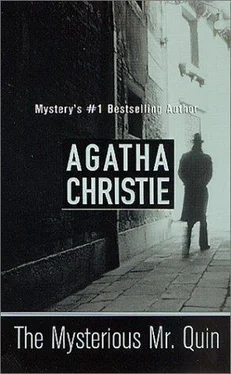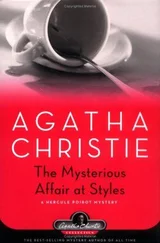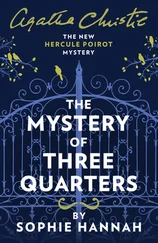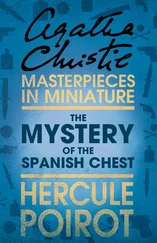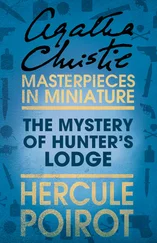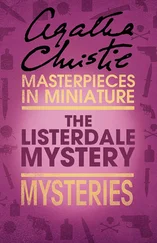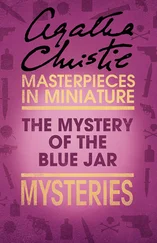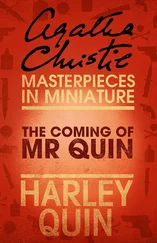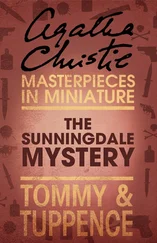Agatha Christie - The Mysterious Mr. Quin
Здесь есть возможность читать онлайн «Agatha Christie - The Mysterious Mr. Quin» — ознакомительный отрывок электронной книги совершенно бесплатно, а после прочтения отрывка купить полную версию. В некоторых случаях можно слушать аудио, скачать через торрент в формате fb2 и присутствует краткое содержание. Жанр: Классический детектив, на английском языке. Описание произведения, (предисловие) а так же отзывы посетителей доступны на портале библиотеки ЛибКат.
- Название:The Mysterious Mr. Quin
- Автор:
- Жанр:
- Год:неизвестен
- ISBN:нет данных
- Рейтинг книги:4 / 5. Голосов: 1
-
Избранное:Добавить в избранное
- Отзывы:
-
Ваша оценка:
- 80
- 1
- 2
- 3
- 4
- 5
The Mysterious Mr. Quin: краткое содержание, описание и аннотация
Предлагаем к чтению аннотацию, описание, краткое содержание или предисловие (зависит от того, что написал сам автор книги «The Mysterious Mr. Quin»). Если вы не нашли необходимую информацию о книге — напишите в комментариях, мы постараемся отыскать её.
The Mysterious Mr. Quin — читать онлайн ознакомительный отрывок
Ниже представлен текст книги, разбитый по страницам. Система сохранения места последней прочитанной страницы, позволяет с удобством читать онлайн бесплатно книгу «The Mysterious Mr. Quin», без необходимости каждый раз заново искать на чём Вы остановились. Поставьте закладку, и сможете в любой момент перейти на страницу, на которой закончили чтение.
Интервал:
Закладка:
He handed back the sketchbook.
"It's very good," he said. "A very good likeness. But why―er―why did you put him in Fancy Dress?"
Her eyes met his for a brief second.
"I see him like that," said Naomi Carlton Smith.
CHAPTER TWELVE
HARLEQUIN'S LANE
MR. SATTERTHWAITE was never quite sure what took him to stay with the Denmans. They were not of his kind―that is to say, they belonged neither to the great world, nor to the more interesting artistic circles. They were Philistines, and, dull Philistines at that. Mr. Satterthwaite had met them first at Biarritz, had accepted an invitation to stay with them, had come, had been bored, and yet strangely enough had come again and yet again.
Why? He was asking himself that question on this twenty-first of June, as he sped out of London in his Rolls Royce.
John Denman was a man of forty, a solid well-established figure respected in the business world. His friends were not Mr. Satterthwaite's friends, his ideas even less so. He was a man clever in his own line but devoid of imagination outside it.
Why am I doing this thing? Mr. Satterthwaite asked himself once more―and the only answer that came seemed to him so vague and so inherently preposterous that he almost put it aside. For the only reason that presented itself was the fact that one of the rooms in the house (a comfortable, well-appointed house) stirred his curiosity. That room was Mrs. Denman's own sitting-room.
It was hardly an expression of her personality because, so far as Mr. Satterthwaite could judge, she had no personality He had never met a woman so completely expressionless She was, he knew, a Russian by birth. John Denman had been in Russia at the outbreak of the European war, he had, fought with the Russian troops, had narrowly escaped with his life on the outbreak of the revolution, and had brought this Russian girl with him, a penniless refugee. In face of strong disapproval from his parents he had married her.
Mrs. Denman's room was in no way remarkable. It was well and solidly furnished with good Hepplewhite furniture―a trifle more masculine than feminine in atmosphere. But in it there was one incongruous item― a Chinese lacquer screen―a thing of creamy yellow and pale rose. Any museum might have been glad to own it. It was a collector's piece, rare and beautiful.
It was out of place against that solid English background It should have been the key-note of the room with everything arranged to harmonise subtly with it. And yet Mr. Satterthwaite could not accuse the Denmans of lack of taste. Everything else in the house was in perfectly blended accord. He shook his head. The thing―trivial though it was― puzzled him. Because of it, so he verily believed, he had come again and again to the house. It was, perhaps, a woman's fantasy―but that solution did not satisfy him as he thought of Mrs. Denman―a quiet hard-featured woman, speaking English so correctly that no one would ever have guessed her a foreigner.
The car drew up at his destination and he got out, his mind still dwelling on the problem of the Chinese screen. The name of the Denman's house was "Ashmead," and it occupied some five acres of Melton Heath, which is thirty miles from London, stands five hundred - feet above sea level and is, for the most part, inhabited by those who have ample incomes.
The butler received Mr. Satterthwaite suavely. Mr. and Mrs. Denman were both out―at a rehearsal―they hoped Mr. Satterthwaite would make himself at home until they returned.
Mr. Satterthwaite nodded and proceeded to carry out these injunctions by stepping into the garden. After a cursory examination of the flower beds, he strolled down a shady walk and presently came to a door in the wall. It was unlocked and he passed through it and came out into a narrow lane.
Mr. Satterthwaite looked to left and right. A very charming lane, shady and green, with high hedges―a rural lane that twisted and turned in good old-fashioned style. He remembered the stamped address― ASHMEAD, HARLEQUIN'S LANE―remembered too, a local name for it that Mrs. Denman had once told him.
"Harlequin's Lane," he murmured to himself softly.
"I wonder―――"
He turned a corner.
Not at the time, but afterwards, he wondered why this time he felt no surprise at meeting that elusive friend of his― Mr. Harley Quin. The two men clasped hands. "So your down here," said Mr. Satterthwaite. "Yes," said Mr. Quin. "I'm staying in the same house as you are."
"Staying there?"
"Yes. Does it surprise you?"
"No," said Mr. Satterthwaite slowly. "Only―well, you never stay anywhere for long, do you?"
"Only as long as is necessary," said Mr. Quin gravely.
"I see," said Mr. Satterthwaite.
They walked on in silence for some minutes.
"This lane," began Mr. Satterthwaite, and stopped.
"Belongs to me," said Mr. Quin.
"I thought it did," said Mr. Satterthwaite. "Somehow, I thought it must. There's the other name for it, too, the local name. They call it the 'Lovers Lane.'" You know that?"
Mr. Quin nodded.
"But surely," he said gently, "there is a 'Lovers Lane' in every village?"
"I suppose so," said Mr. Satterthwaite, and he sighed a little.
He felt suddenly rather old and out of things, a little dried-up wizened old fogey of a man. Each side of him were the hedges, very green and alive,
"Where does this lane end, I wonder?" he asked suddenly.
"It ends―here," said Mr. Quin.
They came round the last bend. The lane ended in a piece of waste ground, and almost at their feet a great pit opened. In it were tin cans gleaming in the sun, and other cans that were too red with rust to gleam, old boots, fragments of newspapers, a hundred and one odds and ends that were no longer of account to anybody.
"A rubbish heap," exclaimed Mr. Satterthwaite, and breathed deeply and indignantly.
"Sometimes there are very wonderful things on a rubbish heap," said Mr. Quin.
"I know, I know," cried Mr. Satterthwaite, and quoted with just a trace of self-consciousness―"Bring me the two most beautiful things in the city, said God. You know how it goes, eh?"
Mr. Quin nodded.
Mr. Satterthwaite looked up at the ruins of a small cottage perched on the brink of the wall of the cliff.
"Hardly a pretty view for a house," he remarked.
"I fancy this wasn't a rubbish heap in those days," said Mr. Quin. "I believe the Denmans lived there when they were first married. They moved into the big house when the old people died. The cottage was pulled down when they began to quarry the rock here―'but nothing much was done, as you can see."
They turned and began retracing their steps.
"I suppose," said Mr. Satterthwaite, smiling, "that many couples come wandering down this lane on these warm summer evenings."
"Probably."
"Lovers," said Mr. Satterthwaite. He repeated the word thoughtfully and quite without the normal embarrassment of the Englishman. Mr. Quin had that effect upon him. "Lovers... You have done a lot for lovers, Mr. Quin."
The other bowed his head without replying.
"You have saved them from sorrow―from worse than sorrow, from death. You have been an advocate for the dead themselves."
"You are speaking of yourself―of what you have done― not of me."
"It is the same thing," said Mr. Satterthwaite. "You know it is," he urged, as the other did not speak. "You have acted―through me. For some reason or other you do not act directly―yourself."
"Sometimes I do," said Mr. Quin.
His voice held a new note. In spite of himself Mr. Satterthwaite shivered a little. The afternoon, he thought, must be growing chilly. And yet the sun seemed as bright [as ever.
At that moment a girl turned the corner ahead of them and came into sight. She was a very pretty girl, fair-haired and blue-eyed, wearing a pink cotton frock. Mr. Satterthwaite recognised her as Molly Stanwell, whom he had net down here before.
Читать дальшеИнтервал:
Закладка:
Похожие книги на «The Mysterious Mr. Quin»
Представляем Вашему вниманию похожие книги на «The Mysterious Mr. Quin» списком для выбора. Мы отобрали схожую по названию и смыслу литературу в надежде предоставить читателям больше вариантов отыскать новые, интересные, ещё непрочитанные произведения.
Обсуждение, отзывы о книге «The Mysterious Mr. Quin» и просто собственные мнения читателей. Оставьте ваши комментарии, напишите, что Вы думаете о произведении, его смысле или главных героях. Укажите что конкретно понравилось, а что нет, и почему Вы так считаете.
